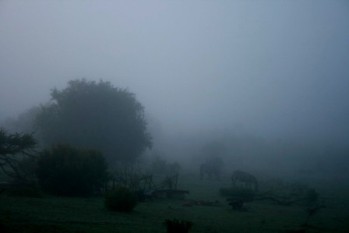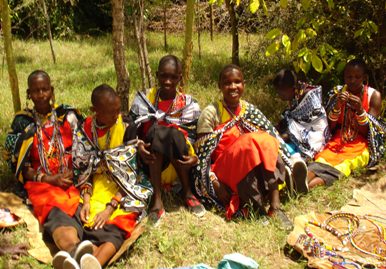It was an unusual way to learn about a safari. I was in Barnes and Noble in New York City, picking up books on the devil, when a young man enthusiastically ran up the escalators to procure a paper-back for me: Talk of the Devil.
The book had nothing to do with Lucifer, but was quite a fine read nonetheless, the young man claimed. Riccardo Orizio, noted Italian journalist for Corriere della Sera and La Repubblica, had taken it upon himself to hunt down the most atrocious living dictators of the twentieth century for a chat over coffee (in prisons and gyms), to see how the deposed powerful now spoke about their past misdeeds -- misdeeds that included, as in Mengistu's case (Ethiopia), more than two million murdered.
The conclusion seemed to be that ethical detours (such as cannibalism or genocide) happen when they are useful and the converse as well: democracy steps in when it too can serve to make a buck. None of the deposed -- from Milosevic's widow to Duvalier -- seemed a bit contrite; rather, the laments tended to range from bad cell phone reception in prison to the need for good fresh vegetable delivery in Saudi Arabia.
A dog eat dog world.
Curiouser and curiouser, I was to find out that Riccardo Orizio had, since the book's publication, given up his extensive foreign correspondent career to take up residence in one of the last remaining wildernesses of the world: the Masai Mara savanna of Kenya, the 1,500 square mile home of the Maasai, a cattle-herding Nilotic tribe. Now, rather than fly to dictators, clients fly to him. His new enterprise: a luxury safari lodge named "Saruni"-- six secluded cabins replete with cedar cabinets, cypress floors and sunken stone showers, each with a wide veranda facing the Aitong Hills, with the occasional herd of zebra or waterbuck grazing below among the olive trees, and a staff of forty Maasai, dressed in traditional red shukas and jangling beads, serving as guides, chefs, servants and masseurs.
Who was this man who had met the devil and now hosted others to wild game?
Riccardo Orizio met me at the airstrip, a cheerful beaming silver-haired man, who jumped with an energetic bounce from the jeep, and within minutes led me, with a gay impish smile, to hippos snorting in a river, their enormous backs black and slithery, while a white stork posed in the center on a gray rock. After hopping down to serve me a silver cup of tea from the back of the jeep, and explaining that the reason he spoke English so well was because he had been a correspondent in London (as well as in Atlanta for CNN), Riccardo drove me across the plains.
Dozens of giraffe, buffalo, white-bearded gnu and Thomson gazelles stretched out as far as one could see, to the left, right and center: a shock of such abundant wildlife that it is almost seemed an animated film, projected in multiplex on the grass. The last time I had been on a safari -- in South Africa -- one really had to look for the beasts.
Here, the only rare beast was the safari jeep: it was low season, and I was practically the only guest.
An enormous rainbow -- pink, blue and purple -- arched over the Kilileoni mountains, and we followed it up to the lodge, bumping over the grass and rocks until, after a long while, we reached a small sign that read Saruni (tranquility in the Massai language). There, a Maasai servant, shivering in a red plaid shuka, led me up a stone path lit with foot lanterns (the occasional frog hopping out of our way), to a private cabin with an enormous canopied bed and an open view of the hills and plains in the distance. As I settled my bags, the sun disappeared over the plains, giving in to a night of great black and white clouds, and the sound of crickets and snorting buffalo.
The shower, deliciously hot, had to be ordered on command: one of the Maasai servants came to burn wood for it. Otherwise, the energy source was more ecological: eighty percent run by solar panels.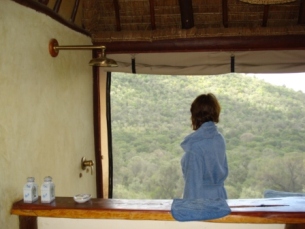 Dinner was lasagna and freshly grilled Tilipia fish from nearby Lake Victoria for me -- and lamb for Orizio -- with a bottle of Italian wine on an unusually long wooden table. ("Made of old railroad slippers," my host explained. "The railroad was destroyed in Kenya a long time ago, when the British left." )
Dinner was lasagna and freshly grilled Tilipia fish from nearby Lake Victoria for me -- and lamb for Orizio -- with a bottle of Italian wine on an unusually long wooden table. ("Made of old railroad slippers," my host explained. "The railroad was destroyed in Kenya a long time ago, when the British left." )
This is clearly a luxury lodge, one of the handful in the Mara where one does not "rough it" in a tent. I was going to look forward to waking -- each morning -- to a streak of sun through the canvas windows, long chirps of birds in the rolling green, a wide cloudless sky and coffee brought to me in bed. Yet, the most exceptional aspect to Saruni Lodge is not necessarily the imported Italian towels. Nor is it the open jeep, imported from South Africa (most jeeps in Kenya are closed). Rather, it is Riccardo Orizio himself. The added bonus of taking a safari from a veteran journalist who had traveled to every major crisis area and war zone -- for nearly twenty years -- is that one learns about the context of the wild beast: its geo-political importance in relation to its greatest enemy, humankind.
One learns, for example, that the politics of Africa is all about the elephant.
It all begins with the fact that wilderness, explains Orizio, is the privileged fantasy of the white man. The upper class are willing to pay dearly for the cherished safari experience, some flying in on their own private planes, and are the first to cheer for policies of conservation -- a fact my host clearly finds ironic.
"Don't you find it strange that the Europeans, who have destroyed their own wildlife -- with their farms, villages and fences -- come to Africa for its wildlife," Orizio knifed with flair a piece of seared lamb, while the lanterns flashed a golden light over our plates on the long table. "And expect Africa to maintain it?"
"You should listen to people here in the Mara," Orizio continued, raising an eyebrow provocatively. "Why do we have to keep our elephants alive, if you whites have killed all your beasts? Do you find wild bison in Paris? So why should we conserve our elephants? Sometimes, it is more profitable to run a wheat farm."
South Africa, Orizio maintains, was smart to sell licenses for killing elephants. "They are numbered, and then the ivory tusks of the hunted elephants can be sold to wealthy Chinese collectors. They turned conservation into a per-buck-profit."
The only way wildlife can survive -- forget sentimentality about extinction -- is if they manage to make a buck. Safaris or hunting.
Otherwise, what good does a lion do anyone?
"Indeed," Orizio added, with the savvy of years of political analysis. "When the Kenya Wildlife Service director Richard Leakey -- in order to protect elephants -- implemented a 'shoot on command' law regarding poaching, he effectively put an end to poaching, with the result that 200 poor native poachers were killed."
"Some asked: who cares about this elephant? Is it worth the life of a poor African?"
The next morning, I traipsed down the stone path for my first "game ride", off to see these last remaining not-yet-extinct profitable beasts.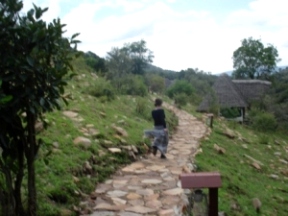 My guide John, a Maasai warrior and a former ranger, a young handsome father of five (hopefully seven one day, he said) and husband of two, met me at the jeep with a great laugh, and confirmed, in his own way, Riccardo's analysis of the economics of ecology.
My guide John, a Maasai warrior and a former ranger, a young handsome father of five (hopefully seven one day, he said) and husband of two, met me at the jeep with a great laugh, and confirmed, in his own way, Riccardo's analysis of the economics of ecology.
Yes, he had killed a lion -- as this was a sign in Maasai culture of manhood -- but these days, young Maasai males are told that to prove their manhood it is better to go to school. It would be best to go to school, John continued, so as to learn how to conserve the wildlife, and maintain the land for tourism: for this is where the future (profit) lies.
He also noted that the Maasai themselves have never hunted wildlife. Their staple diet is warm blood -- siphoned from the neck of the cow -- mixed with fresh milk.
"No," John said, flat out. "It will kick you." He paused with a grin. "Okay, but only if it is dead......And I mean completely dead."
However, I wondered, might there not be one animal without this collective memory, who is entertained by the smell of humans?
Apparently not, as no animal gave our parked jeep even a fleeting glance.
Indeed human beings are not any animal's first choice of prey, I learn, although the jackal and hyena would lick a cadaver clean if it happened to be lying about -- each in his or her turn, of course.
An eagle soared nearby with outstretched black wings; she would be the last to eat.
The lion took her time, gnawing on forelimbs, ripping out the white tendons with her teeth, and slicking down red muscle down her throat, while the black-white skin flopped about like loose pantyhose. When nearly only the long snout and ears were left, the lion gave one ear a long sensuous lick, and then, belly heavy, sauntered across the plains towards the bush.
Immediately the mean-snouted spotted hyenas jumped in to the prey, while the sweet jackals pranced about, grabbing slabs of bloody steak in their mouths -- running off whenever the hyenas would paw in their direction, a bit like that game "red-light, green-light" played by children.
"What do you think is the difference is between humans and animals?" I asked my guide as I observed this greedy behavior -- already knowing one difference: that no lion would make me laugh, as did John.
"Aren't humans animals?" I continued, thinking about Riccardo's interviews as well as some of my own more selfish instincts. "Aren't they the same?"
"No," said John. "Very different."
"Are you sure?"
"Sure."
A bushy-tailed Colobus monkey sprinted across the savanna.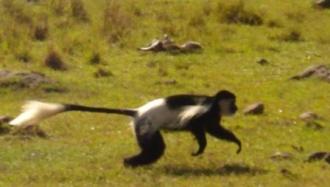 I also was to learn that no animal dies of old age. Rather they die of starvation. When they get old, their teeth fall out and they cannot eat. And no altruistic grandchild goes about collecting steaks or grasses for the elderly. "Help is not to be found in the animal kingdom," John explained.
I also was to learn that no animal dies of old age. Rather they die of starvation. When they get old, their teeth fall out and they cannot eat. And no altruistic grandchild goes about collecting steaks or grasses for the elderly. "Help is not to be found in the animal kingdom," John explained.
Yet, while we humans do tend to help our elderly (when not making a profit with retirement homes or selling sleazy mortgages), there are plenty of instances where humans act a bit like the hippo, the most dangerous animal on the African continent, who will bulldoze anyone in its path. For example, Riccardo had been telling me over dinner that while war correspondent in Bosnia, he had driven with Croatian tanks, past burning houses, with Serbs inside screaming.
"Are there people inside?" he had politely asked.
"Perhaps," was the driver's indifferent response.
"We are different," John repeated stoically, with a firm laugh, and offered me my picnic breakfast: sausages, pancakes, eggs and pineapple, with coffee and milk, sitting on a little fold-out chair by the jeep, among the grazing wildebeest.
Quite a peaceful moment.
"And life after death?" We sipped our coffee in our laps. "What is the Maasai opinion on that one?" I had read that traditionally the Maasai did not bury their dead, but left the cadavers for the wild beasts to gnaw.
"No," said John. "When you are dead you are dead. Completely dead."
"Just like a zebra?" I said.
"Like a zebra."
Later that evening, over a bottle of Italian wine at the fireplace, I posed the same beast-versus-human questions to Riccardo.
For him, there was also a big difference between humans and animals. It did not lie in ethics, however.
But in creation. Only humans know how to create.
He himself was a testimony of the power of creation, the human ability to shift gears, make things anew. His lodge -- just six years old -- included a library overlooking the savanna, filled with books on Africa, from Doris Lessing to Salman Rushdie, as well as a European-style Well-Being massage center, where a shy young Suburu woman named Selma used traditional herbs to give clients a complimentary massage.
And like the food share on the plains, Riccardo's creation also has a trickle down effect. It effectively gives employment to thirty Maasai. Moreover, the park fees collected by the Maasai (all this land was private) helped to maintain the conservation of the animals. And as other safari owners, Riccardo also leases thousands of acres of Maasai land nearby, to assure that they don't graze cows in eye-sight of the tourists, another way to keep the land pristine.
Lulled by the timeless pleasure of being in wide open nature -- and habituated to waking up to lions crunching bones in the early morning sun -- I decided to stay on at the safari a week, going against the typical safari stay of 3 nights and ignoring the maxim of one cynical friend "that once you have seen one animal, you have seen them all."
Apparently others have the same idea. At lunch the next day, I met the only other couple staying at Saruni Lodge that week: an oil executive and wife on their twenty-eighth year of safaris, which included lodges from Mozambique to Namibia to Botswana.
"Why so passionate about safaris?" I asked."One never tires of the animals," said the retired elderly man with a beaming smile, leaning forward from his wheelchair (he had polio).
"There is always something new!" rejoined his wife. "Today it was a pair of baby chick lilac breasted rollers."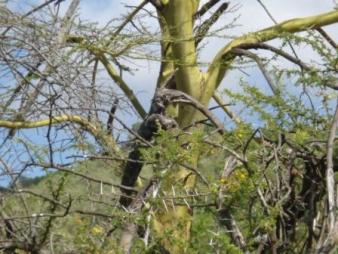 It was true: each minute in the jeep was a chance to see something new. Something new with a plot. I was to witness more dramatic stories in an hour than take place among my entourage in Paris over months.
It was true: each minute in the jeep was a chance to see something new. Something new with a plot. I was to witness more dramatic stories in an hour than take place among my entourage in Paris over months.
A pretty tan and black cheetah sat on a termite hill, overlooking the empty plains, with her two cubs cuddling in her belly, a few white butterflies fluttering nearby.
She arched her back.
"She's hungry," said John.
"Poor gazelle," said John, shaking his head.
The cheetah leaped down, and her two cubs sprung behind her in the grass.
No luck to see the kill. The only actual kill I would see during my week at the safari was when Riccardo's fiance, Norwegian artist Mariane's cat, teaching her kittens how to hunt, leaped upon a rat under a cupboard, and gnawed it in the neck.
Then there is the romance. Two brother lions were sleeping in the sun under an orange leaf cotton tree. Twenty minutes later, a young female lion sauntered over; one brother leaped up and pursued her across the plain --
"Ah mating!" said John.
Not so fast. Across the plain -- with wild leaping legs -- came the leader of the pride. The two male lions sparred; the young female -- bored -- fell asleep in the sun The best thing about safaris, however, is the learning curve: not one day passes without a new fact. Today I learned that hyenas are such ravenous creatures that if wounded in the stomach, they will eat their own intestines, chewing and running until they die. Later, staring at a family of elephants slurping in the desert date trees, and a baby elephant that John murmured was "so sweet" (its long trunk the size of its tiny wrinkled body), I learned that elephants eat for eighteen hours a day, as their digestive system is inefficient. Similarly, the giraffe also chews for hours until a small ball of chewed food rolls in a knot down their long throat.
I -- a late sleeper -- also learned that those who say we should follow nature and rise and set with the sun are fools. No animal does this. They keep alert at night, and perhaps nap an hour or so in the day.
In fact, anyone who uses "animals" as justification for any human behavior should go take a safari or two. It is a relief to learn -- after hearing some of Riccardo's war correspondence -- that not all animals are naturally territorial. Some, like the matriarchal elephant troop or the chewing giraffe -- wander more than twenty kilometers per day, clearing the land.
Indeed for any rule cited as "natural" -- from male superiority to treatment of the young -- there is always an exception.
Just as with humans themselves.
It is -- no coincidence -- the same thing that drew this exuberant pioneering man to journalism. For Riccardo, journalism was a chance to be at the edge of the circumference, to feel the relativity of truth, depending on where you are and who is speaking. "The "center of reality" is constantly shifting, he tells me, depending on one's geographical location and interest, and as a journalist you have the privilege of going from one center to another, ultimately learning that that there is no one center.
"Makes me feel quite privileged."
Similarly, here in Africa, one may ask oneself, what is the best reality? A state-of-the-art Macintosh program invented in March 2009, or a zebra who has been on this earth for millions of years?
"Here I have the privilege of both," said Riccardo, beaming under the hot Kenyan sun on the lodge deck. "A chance to be part of the Western accomplishments -- its technology, its education -- and privy to the animals of a million years ago."
Living in Africa is also, he added, a way not to become weak -- like so many who live in the West, in their pre-fabricated cocoons, not daring to be out of any environment that doesn't have a supermarket nearby. On the savanna, he not only had to make his own bread, but he had to go personally to Nairobi to get the gas to bake it.
"When one relies too much on convenience, one becomes vulnerable," he said. "And then the stronger can attack. This is what September 11th was all about: reminding Americans what the rest of the world already knows. That no protection is sure."
I asked Riccardo what he himself had learned from the animals, this new foreign culture his journalistic eye observed from day to day.
"Nothing. I am not here to learn anything from them. I look with childlike marvel at their beauty. I find them extremely beautiful and exotic and unusual and I get pleasure from being able to say there are some very strange white and black striped kind of horses which have been here for millions of years."
We adjourned to the bonfire, where ten young Maasai warriors surprised us with a dance, lined up in a row, each jumping as high as he could. Their elastic springy knees folded to their chests as each tried to out-jump the other.
A way to win the women, I was told.

